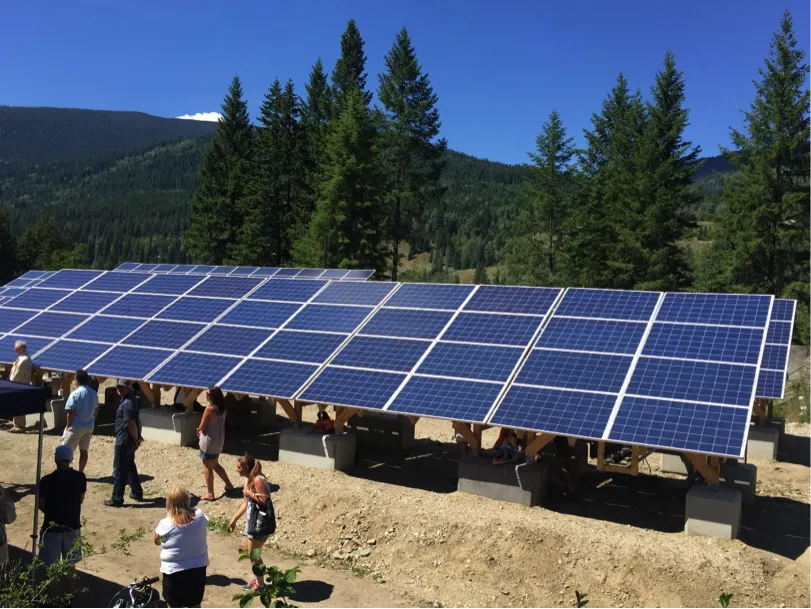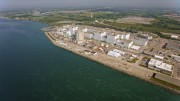This June, the mountain town of Nelson, B.C. became home to Canada’s first municipally-owned community solar garden. The “garden” is a 60 kW array comprised of 240 ground-mounted solar panels operated by Nelson Hydro and sited beside Nelson Hydro’s historical Bonnington generating station. A solar garden is an innovative model to bring solar electricity to electricity customers that otherwise wouldn’t do it. Community solar is a solar power plant where the electricity produced is shared by more than one household.
Rather than installing solar panels on their own rooftops, participating Nelson Hydro customers subscribe to the solar garden by paying a one-time $975 upfront cost for the number of solar panels they want to buy. Their panel produces electricity for the electrical grid and in return subscribers receive credits on their utility bill for that electricity. This is called “virtual net metering,” and is becoming an increasingly popular way to add renewable energy to a system.
Solar access for all
The solar photovoltaic (PV) panel is emerging as a leading renewable technology offering a low-greenhouse gas footprint and a very affordable form of electricity generation. Yet many households and businesses can’t install solar PV on their rooftops. This includes renters and condo dwellers who can’t access their roof, or homes or businesses who wouldn’t benefit from rooftop solar due to shading from trees or nearby buildings. Community solar arrays such as the one in Nelson give access to this resource for many such individuals and businesses. In addition, community solar arrays are built at larger scales than traditional rooftop solar so can benefit from economies of scale. The Rocky Mountain Institute predicts that community solar models can save up to 40 per cent of costs.
The virtual net metering ownership model also means that when participants move to a new home or facility within Nelson Hydro’s customer base, the solar panels stay in the community garden and the credits follow the customer.
Community solar arrays can also provide benefits to utility companies that implement them. It is easier for utilities to manage one central community array than many systems distributed on different buildings. It can also be an easy way to meet distributed generation or renewable energy targets while offering customers electricity from renewable energy resources they may have no other way to access.

Utilities such as Nelson Hydro are showing leadership in developing community solar gardens, as are others. For example, SolarShare is a renewable energy co-op based in Ontario that provides an RRSP-eligible investment vehicle for its customer base and has generated investment returns of over $13 million. The Ottawa Renewable Energy Co-op (OREC) is another community-owned and financed group that had one of the first third-party net metered projects in Ontario. For another creative approach to community solar, have a look at rural electric associations like Steele-Waseca Co-operative Electric, which paired a community solar garden program with their electric water heating program to reduce utility bills for its entire customer base. And even if groups that are interested do not have all the means available, they can look elsewhere to invest in community solar, like the roof of their local church.
Community solar represents a monumental opportunity for Canadians to benefit from their electricity production. In the U.S., the market for community solar is expected to reach 30 GW by 2020. These unique ownership models should be unlocked in Alberta to give ordinary individuals and communities an equal opportunity to benefit from our abundant solar resource. Governments can encourage community solar by making electricity billing fair for all solar small-scale in Alberta. When communities have a stake in their local electricity generation, they benefit more from the results and are better aware of their energy consumption.










